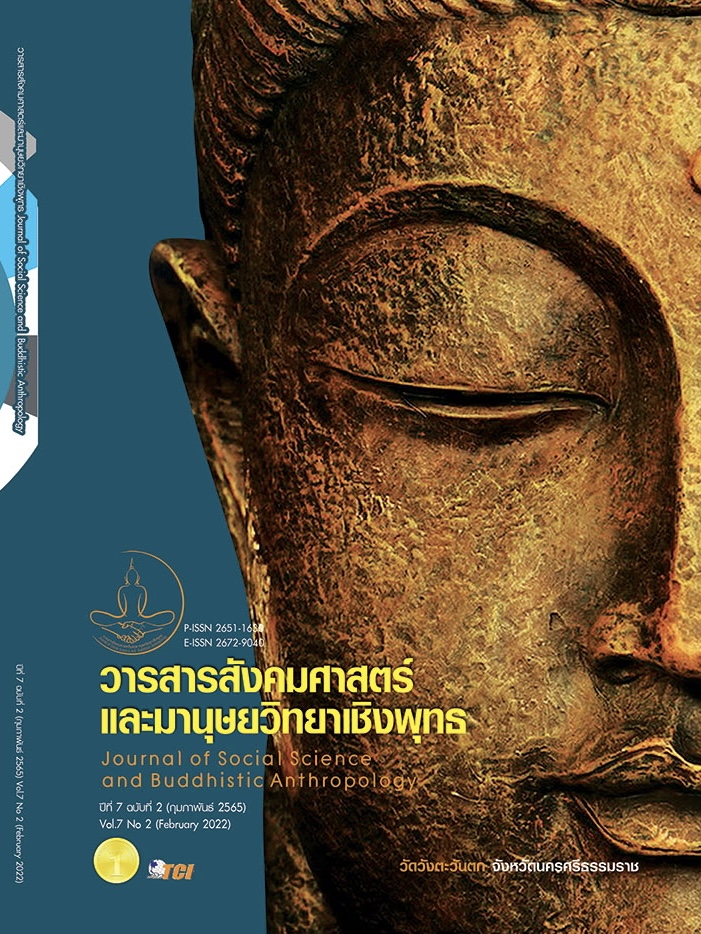THE DEVELOPING OF APPLICATION PERCEPTION OF BRAND PERSONALITY OF COMMUNITY ENTREPRENEURS: CASE STUDIES IN CHONBURI PROVINCETHE DEVELOPING OF APPLICATION PERCEPTION OF BRAND PERSONALITY OF COMMUNITY ENTREPRENEURS: CASE STUDIES IN CHONBURI PROVINCE
Keywords:
Application Development, Brand Personality, Community Enterprise Products, Digital MarketingAbstract
The objectives of this research article were to 1) develop and evaluate the effectiveness of a brand personality classification application, 2) study the perception of brand personality among community entrepreneur, and 3) compare product sales of community enterprise products at Participated in the Community Digital Center project after using the application, a period of 4 months. The research population consisted of 40 experts and entrepreneurs. 1) The brand personality perception questionnaire 2) the application development scope opinion questionnaire, 3) the application performance evaluation questionnaire, and 4) the brand personality perception interview form. Statistics used in data analysis These are mean and standard deviation. The research results showed that 1) the application process has 6 parts: 1.1) Membership application 1.2) Personal information 1.3) Community enterprise product information 1.4) Brand identity questionnaire 1.5) Brand identity description, 13 brand identity and 1.6) Appropriate marketing promotion strategies 2) Application performance It was found that the experts found that the suitability was at an excellent level. 3) The overall brand personality perception of the entrepreneurs was at a high level. Receive advice on how to communicate marketing each identity of the community enterprise product. Know the marketing strategies that are suitable for the product and can be applied in selling products. In 4 months, it was found that entrepreneurs learned to recognize the brand personality of one's products. Be able to use online marketing strategies that are suitable for the product. It is in line with the needs of consumers and is linked to the current situation. As a result, the number of product sales has continued to increase.
The objectives of this research article were to 1) develop and evaluate the effectiveness of a brand personality classification application, 2) study the perception of brand personality among community entrepreneur, and 3) compare product sales of community enterprise products at Participated in the Community Digital Center project after using the application, a period of 4 months. The research population consisted of 40 experts and entrepreneurs. 1) The brand personality perception questionnaire 2) the application development scope opinion questionnaire, 3) the application performance evaluation questionnaire, and 4) the brand personality perception interview form. Statistics used in data analysis These are mean and standard deviation. The research results showed that 1) the application process has 6 parts: 1.1) Membership application 1.2) Personal information 1.3) Community enterprise product information 1.4) Brand identity questionnaire 1.5) Brand identity description, 13 brand identity and 1.6) Appropriate marketing promotion strategies 2) Application performance It was found that the experts found that the suitability was at an excellent level. 3) The overall brand personality perception of the entrepreneurs was at a high level. Receive advice on how to communicate marketing each identity of the community enterprise product. Know the marketing strategies that are suitable for the product and can be applied in selling products. In 4 months, it was found that entrepreneurs learned to recognize the brand personality of one's products. Be able to use online marketing strategies that are suitable for the product. It is in line with the needs of consumers and is linked to the current situation. As a result, the number of product sales has continued to increase.
References
เกษมสันต์ พิพัฒน์ศิริศักดิ์. (2559). การจัดการทางการตลาด. (พิมพ์ครั้งที่ 7). ปทุมธานี: มหาวิทยาลัยกรุงเทพ.
ดรุณี พลบุตร. (2557). พฤติกรรมผู้บริโภคและปัจจัยการสื่อสารการตลาดที่มีผลต่อการตัดสินใจซื้อเครื่องประดับบนเครือข่ายสังคมออนไลน์ของผู้หญิงในเขตกรุงเทพมหานคร. ใน สารนิพนธ์วารสารศาสตรมหาบัณฑิต สาขาวิชาการจัดการการสื่อสารองค์กร. มหาวิทยาลัยธรรมศาสตร์.
นววัฒน์ สิทธิพรม. (2558). การรับรู้คุณค่าตราสินค้าผ่านสติ๊กเกอร์ของผู้ใช้ไลน์แอปพลิเคชัน (LINE sponsored sticker). ใน วิทยานิพนธ์วิทยาศาสตรมหาบัณฑิต สาขาวิชาระบบสารสนเทศเพื่อการจัดการ. มหาวิทยาลัยธรรมศาสตร์.
บุญใจ ศรีสถิตย์นรากูร. (2547). การวิเคราะห์ตัวแปรจำแนกกลุ่มมหาบัณฑิตจุฬาลงกรณ์มหาวิทยาลัยที่สำเร็จการศึกษาหลักสูตรพยาบาลศาสตรมหาบัณฑิตโดยใช้ระยะเวลาศึกษาภายในสองปีการศึกษาและมากกว่าสองปีการศึกษา. วารสารการศึกษาพยาบาล, 16(1), 71-78.
พรทิพย์ บุญญาณ และกิตติพงษ์ โสภณธรรมภาณ. (2560). การรับรู้การตลาดเชิงบูรณาการต่อผลิตภัณฑ์โทรศัพท์สมาร์ทของผู้ให้บริการระบบโทรศัพท์เคลื่อนที่มนุษยศาสตร์และสังคมศาสตร์. วารสารวิชาการ มทร. สุวรรณภูมิ (มนุษยศาสตร์และสังคมศาสตร์), 2(1), 1-15.
พรรณิสา นิมมานโสภณ. (2557). ปัจจัยที่ส่งผลต่อการตัดสินใจซื้อเสื้อผ้าผู้หญิงจากร้านค้าออนไลน์ผ่านแอปพลิเคชันอินสตาแกรม. เจซี เจอร์นัล, 7(3), 234-252.
สำนักงานส่งเสริมวิสาหกิจขนาดกลางและขนาดย่อม. (2557). รายงานสถานการณ์วิสาหกิจ ขนาดกลางและขนาดย่อม ปี 2557. กรุงเทพมหานคร: สำนักงานส่งเสริมวิสาหกิจขนาดกลางและขนาดย่อม.
Aaker, D. A. (1991). Managing brand equity. New York: The Free Press.
Avis, M. (2015). Brand personality factor-based models: A critical review. Australasian marketing journal, Elsevier, 20(1), 89-96.
Cohen, J. (1988). Statistical power analysis for the behavior sciences. (2nd ed). Hillsdale NJ: Lawrence Erlbaum.
Keller, K. L. (1993). Conceptualizing, Measuring, and Managing Customer-Based Brand Equity. Journal of Marketing, 57(1), 1-22.
Downloads
Published
How to Cite
Issue
Section
License
Copyright (c) 2022 Journal of Social Science and Buddhistic Anthropology

This work is licensed under a Creative Commons Attribution-NonCommercial-NoDerivatives 4.0 International License.









